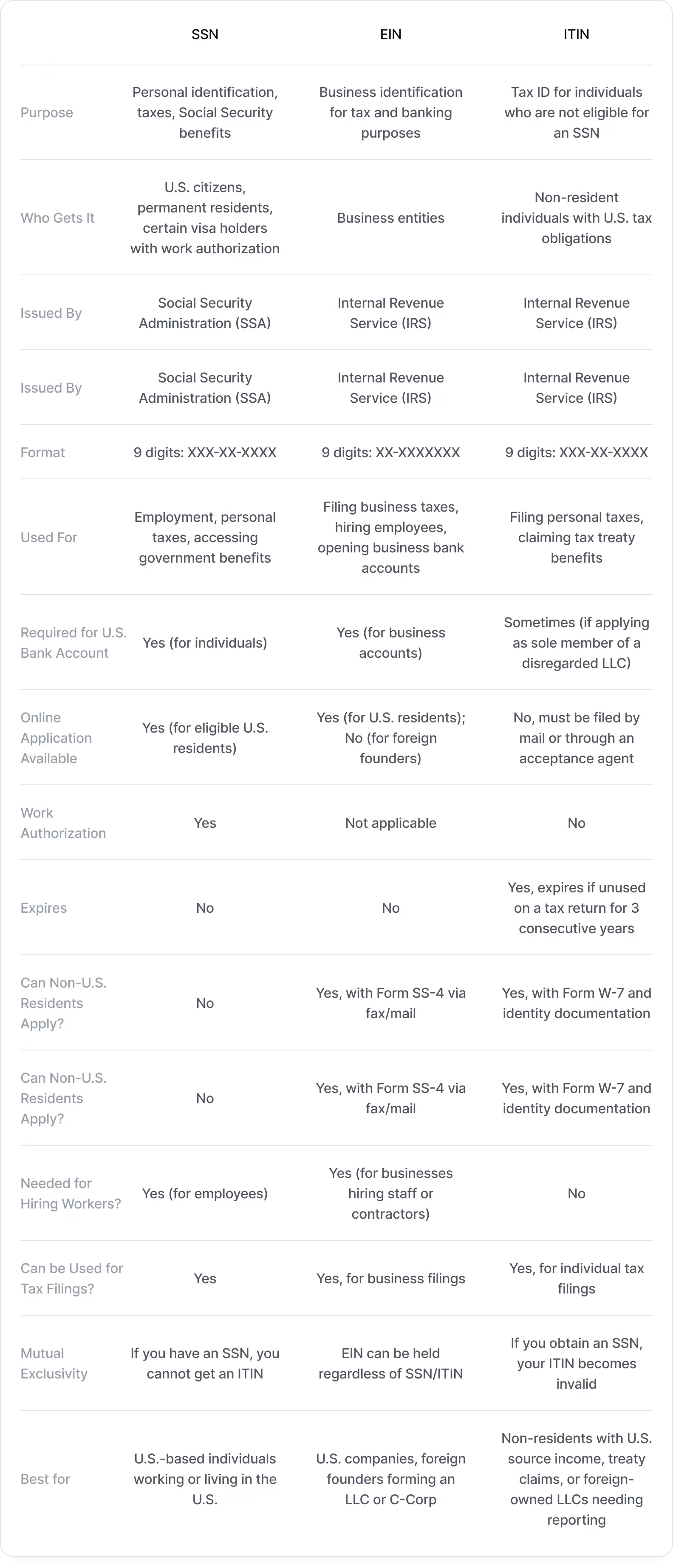
Do I Need an SSN, EIN, or ITIN? How Are They Different?
If you’re launching or managing a U.S. business, understanding the difference between SSN, EIN, and ITIN can help you avoid delays with banking, taxes, and legal filings. Whether you’re a U.S. resident or a non-resident founder, here’s what you need to know before you apply.
TL;DR
- SSN is for U.S. citizens and residents — not required to start a U.S. company if you’re a non-resident.
- EIN is like a tax ID for your company — required for any LLC or Corporation, even if you’re not a U.S. citizen.
- ITIN is for individuals who don’t qualify for an SSN but still need to file U.S. tax returns.
- Foreign founders can form a U.S. company and open a business account without an SSN or ITIN — but they will need an EIN.
- Some platforms may still request an SSN or ITIN — workarounds exist, depending on your provider.
When and Why You Need Each One
SSN (Social Security Number)
The SSN is issued by the U.S. Social Security Administration. It’s used for personal identification, taxes, and employment. You must be a U.S. citizen, green card holder, or authorized to work in the U.S. to get one.
You need an SSN if:
- You’re working as an employee in the U.S.
- You’re a U.S. resident founder applying for business credit or payroll
- You’re managing a business as a sole proprietor using your own personal identity
SSNs are not issued to foreign founders who don’t live or work in the U.S.
EIN (Employer Identification Number)
The EIN is issued by the IRS and used to identify a business entity — including LLCs, C-Corps, and nonprofits. It’s required for opening a business bank account, hiring employees, paying U.S. taxes, or applying for credit.
You need an EIN if:
- You form a U.S. company (LLC, Corporation, Partnership, etc.)
- You want to open a business bank account in the U.S.
- Your business needs to file federal tax returns
- You plan to issue 1099s to contractors or hire employees
Foreign founders can apply for an EIN without an SSN or ITIN, but only by submitting IRS Form SS-4 via fax or mail, not online.
ITIN (Individual Taxpayer Identification Number)
The ITIN is issued by the IRS for individuals who are required to file a tax return in the U.S. but aren’t eligible for an SSN. This includes many non-resident founders, investors, and dependents.
You may need an ITIN if:
- You’re a non-resident with U.S. source income (e.g. dividends or royalties)
- You own a U.S. LLC taxed as a disregarded entity and need to report taxes personally
- You’re entitled to treaty benefits and need to file a W-8BEN with your ITIN
To get an ITIN, you must submit Form W-7 and provide proof of identity and foreign status. In some cases, you can apply with a tax return, or through an IRS-authorized agent.
Key Terms You Should Know

Final Thoughts
SSN, EIN, and ITIN all serve different roles — one is for U.S. citizens and residents, one is for businesses, and one is for non-residents. If you’re forming a U.S. company as a foreign founder, you likely need an EIN. You might also need an ITIN if you’re subject to U.S. tax reporting.
The process can be slow and sometimes confusing, especially for non-residents, but understanding these terms makes it easier to move forward.












